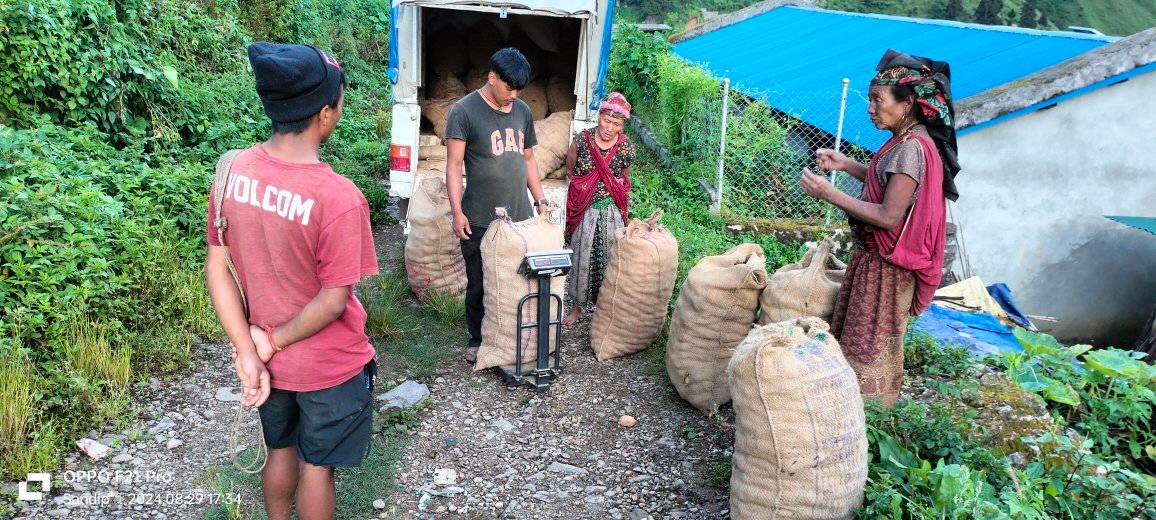
Sabita Biswokaram works at Maring Multipurpose Cooperative in Bhume Rural Municipality, East Rukum, as a marketing representative. Her duty is to visit villages, organize group meetings with cooperative members, and collect their savings.
Bhume Rural Municipality is located approximately 500 kilometers west of Kathmandu, the capital of Nepal. East Rukum is known as a remote and underdeveloped Himalayan district. However, even in this rural area, Sabita enjoys her job and performs it with confidence. She carries a notepad provided by the cooperative, where she keeps all records such as collected savings and member details. Her work has become smarter and faster by reducing the need for paper. “It has made our work very fast and smart,” she explained. “If needed, we can show all members’ records and their deposits in the field.”
Maring Multipurpose Cooperative was established in 2016 with 209 members, most of whom were families of individuals injured, disabled, or missing during the Maoist insurgency in Nepal. According to Sandeep Adhikari, the manager of the cooperative, the initial capital was 3 million Nepalese rupees. Now, it has grown to about 30 million rupees, and the cooperative has 2,024 members.
“We aim to improve farmers’ livelihoods through agricultural production,” he said. “We are working as a bridge between farmers and the market.”
The cooperative collects agricultural produce from local farmers and ensures it reaches the market. Adhikari said the cooperative earns a margin of NPR 5 per kilogram on all produce. “We simply facilitate the connection between farmers and the market,” he said. “Before the cooperative was established, farmers were forced to sell their produce at very low prices. Now, they get a fair price.”
The cooperative sells about 300 million rupees’ worth of agricultural products each year. These products are supplied to cities including Pokhara, Kathmandu, Butwal, Dang, and Nepalgunj.
With increasing business, the cooperative has also made its services smarter for members. Depositors receive mobile messages when they deposit or withdraw money. Interestingly, even a village cooperative now provides digital services similar to those in urban areas.
The cooperative has its own app, website, and other digital tools. Members no longer need to visit the cooperative to deposit or withdraw money—they can do it easily from home through the app.
Practical Action launched the Empowering Women Farmers through Digital Finance, Nepal (Samunati Digital Finance Project), targeting women and small-scale farmers in the rural areas of Rukum, Rolpa, and Dang with collaboration Rural Municipalities and Deprosc Nepal.
The project aimed to empower women through digital financial literacy, help them access banking services, and use mobile banking effectively. One component focused on strengthening cooperatives, making them smarter and more trustworthy. Santosh Adhikari, Project Manager of Samunati Digital Finance, said that during the project period, 14 cooperatives were supported, and among them, 10 have become fully digitalized, including Maring Multipurpose Cooperative. The project is scheduled to end this December. “We supported cooperatives to become smarter and strengthen their capacity,” Adhikari said. “It has made financial services more accessible and easier for people.”
Gurubaba Multipurpose Cooperative in Dangisaran Rural Municipality, Dang has 6,000 members and works with rural farmers. Balu Ram Chaudhari, the manager, said the cooperative has introduced a mobile app and is working toward becoming cashless. “This is our second year of becoming smarter. About 30% of members no longer visit the cooperative to deposit money or request loans—they do it through our system,” he said. “It has saved time and made our work more efficient.”